It's the turn of Simon Panton, Publisher and Journalist. Simon is based in North Wales and runs GroundUp Publishing. He also writes the 'Simon Panton's Bouldering Scene' articles for Climber Magazine which have developed a cult following and led to Simon being known as 'The Godfather of Bouldering'
. His bouldering website North Wales Bouldering does exactly what it says in the title and Simon is also a director of V12 Outdoor. Here he describes the routine of route checking, article writing and making ends meet.
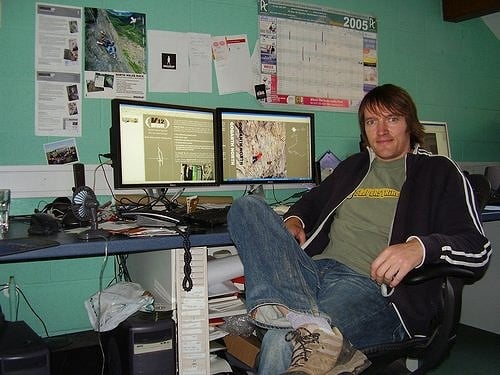
Age: 40
Job Title: Guidebook writer/editor/publisher, magazine writer, website editor.
Relevant Qualifications:
Most people I know who are involved in the outdoor publishing/writing scene have no vocational qualifications. They may have a degree, but typically this will be in something completely unrelated. The designers usually have been to college and you do get the odd person who has studied journalism, but mostly people have fallen into it in a self taught, experiential manner. I have a degree in Geography, which has proved surprisingly relevant, especially when it comes to mapping out areas. If anything it gave me a heightened sense of spatial awareness.
Computer literacy is important, but I've learnt everything I know on the job. I was a bit of a Luddite before I did the North Wales Bouldering guide, however these days I've become quite proficient in a number of software packages. All the really techy image manipulation stuff is done by our designer, but nonetheless it does help to have a working knowledge of the software.
A good standard of written English is essential, however again I'm not sure you need to study this specifically. There are plenty of good books on the subject, and practice does make perfect. Editing other people's work can be quite a brain warping experience. I started off editing my own work, mostly because I hated being heavily edited by others. I then applied the same principals to other people's work. Mostly it's just a question of deconstructing a piece of writing, clipping away the waffle and adding in little bridges to make it flow and clarify the meaning. Sometimes though, it is a nightmare and you have to completely re-write whole sections because the syntax is so messed up.
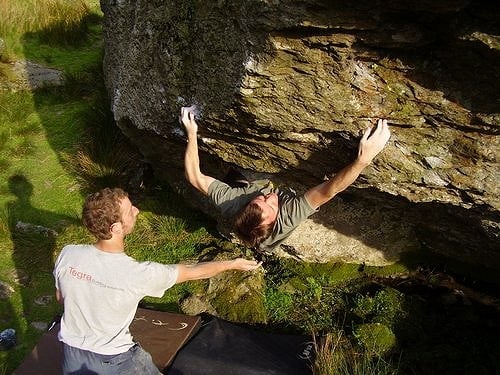
Salary:
Not much; I only pay myself £10 an hour for the work I do for Ground Up. I know I've got to keep a lid on our overheads or else we will go bust. Once we become more established I'll be looking to increase that hourly rate, and one day in the distant future there might even be some director's dividends due. When I work for Climber I get paid 10p per word or a deal rate for a regular article series, for example I get £250 a pop for the Stone Circles articles, but out of that I have to cover any travel or accommodation costs myself. I'm not by any stretch of the imagination a professional photographer, but I do get the odd picture published – there is a sliding scale of payment with magazines (i.e. a small pic will get you £20 and a front cover a few hundred quid). I also still earn a few thousand every year from the sales of the North Wales Bouldering guide.
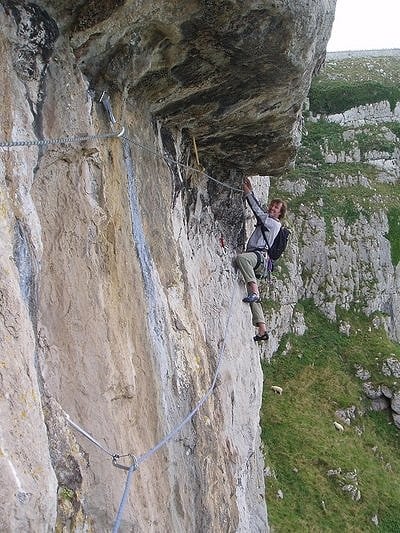
I take pretty standard holidays; about 5 or 6 weeks off per year. The main perk is flexibility. During the winter months I often take an afternoon off to go climbing outside, and then work in the evenings to catch up. This last winter I only climbed indoors 2 or 3 times, and I was still going out 3 times a week. Ironically I've just started training on a new indoor board for the first time in years. It's so good that I'm planning on spending a lot more time indoors, well at least until my elbows give up the ghost!
Describe your job:
I work on Ground Up books on average 4 days a week (the other day of the week I spend writing articles and columns for Climber magazine). The work is mostly office based, editing text and photographs, drawing topos, meeting with crag researchers and processing the information they provide. Ground Up's designer, Al Williams is an old friend based in Sheffield. Most days we will talk on the phone discussing various technical aspects of layout, images, book concepts etc. Al is a climber and an artist. He brings a lot to the table and I'm very grateful for his contribution to Ground Up. There is some field work, but probably not as much as people might think. Ground Up has a large network of psyched people who provide us with photographs and the raw material of first hand experience on the crags. I tend to angle some of my climbing activity towards whatever book we are working on. If something needs checking out I'll convince one of my mates to come along for a climbing/research session. Back in the office there is some admin/financial management work and some promotional work too; writing news items for the website, articles etc.
How did you get this job? How long did it take? Any hardships? Did you always want it or did it just happen?
About 10 years ago when I was managing the old Outside shop in Llanberis (now V12 Outdoor) I produced some photocopied punk style bouldering fanzines under the Northern Soul title. I also started writing regularly for the climbing magazines (primarily Climber). This eventually led me to producing the North Wales Bouldering guide in 2004. By then I had left outdoor retail (although I am still a director of V12 Outdoor) and was working part time for Snowdonia-Active as a press officer/website editor. In 2005 I started Ground Up with fellow V12 director Rob Wilson, and shortly after Streaky Desroy and Simon Marsh came on board too – Ground Up has always been a very community orientated thing, just old friends from the climbing scene really.
What attracted you to the job in the first place?
I've always been an obsessive trainspotter type, plus I've always had a creative urge; back in my younger days I produced a music fanzine with a friend which we used to sell at gigs. I could also see that there was a real need for change in the way guidebooks were being produced in North Wales. I guess the magazine work fits well with my trainspotter tendency. Plus I'm an opionated ranter when you get me going (one of my old nicknames is 'rant-on'). Just add some beer and I'll bull on endlessly about climbing, or anything really!
How long have you been in the job now? How long do you see yourself continuing?
If you include the Northern Soul fanzines, then I suppose I've been doing it for over 10 years. I'd quite happily continue with it for the rest of my days, perhaps branching out into something else if it takes my fancy.
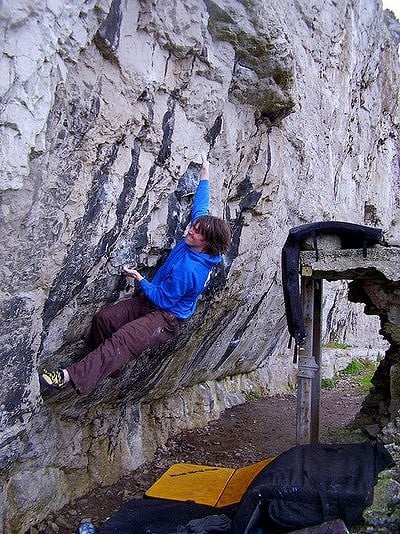
I normally drop the kids off at school in Llanberis at quarter to nine in the morning, and then get into the office at Caban in Brynrefail for about ten to nine. There'll be emails to answer, and perhaps a call to Al the designer to clarify what we are working on today. I'll then check my ever evolving job list and get stuck into the most pressing job. Sometimes I'll make a crag visit to check approach details or take some crag photos. My job is quite diverse; some days I'll be sorting out adverts, talking to clients, arranging artwork etc, other days I'll be producing amendment sheets for Al, or talking to printers about whatever job is coming up. Once or twice a month I go off with Ray Wood and do a photo shoot for the Stone Circle articles that I write for Climber mag. On a normal office day I break for dinner around 1.00 and work until around 6ish, or later if I'm trying to get something finished. In the winter months if I've been out climbing in the afternoon I will work late in the evening to catch up. I don't normally work weekends, but I will if I've got a magazine deadline looming or there is an important piece of guidebook work to be finished. I guess every time I go to a crag I am collecting information and photographs that I can use, either for the guidebooks, the websites or for Climber mag. The boundary between work and play is quite blurred. I've always got a camera with me when I go climbing (I normally climb 4 times a week) – you never know when you'll come across something worth photographing.
Is it how you/other people imagine it to be?
It is much more intense than I imagined. I'm sure most people would be shocked just how intricate and involved modern guidebook production is. The magazine and website work is also very involved, and probably a good deal less glamorous than people think.
The best day? The worst day?
The best days are when you manage to pull something really exciting together, when Al sends back some new page layouts and you realise that you've got something truly great. I like it when a magazine article comes together well, or when you're breaking an exciting news story. Strangely enough the best days are not when I get the freshly published book in my hands. By that point I'm too stressed out worrying about minor imperfections. I didn't enjoy looking at North Wales Rock until several months after we'd published it – I needed a bit of time to clear my head. Of course when I look at it now, I feel a strong sense of pride. I can see how amazing it is, and I get quite a buzz when I see people sat in the pub reading it or pulling a copy out of their rucsac at the crag. The bad days are when I get stressed out about money issues, or when I've got a magazine or book deadline is looming and the work has stacked up. But then again, I do get psyched when I lock into a groove and start working quickly. Sometimes the pressure is good, it makes you perform better.
I still haven't mastered the art of predicting when a book will be finished. North Wales Rock was very late, and it looks like Gogarth North will be a few months late (I had announced June as the release date!). Hopefully I'll get back on track with the North Wales Slate guide this autumn.
Why is it great being a guidebook writer/publisher and why is it rubbish?
It is great because of the freedom, being your own boss, the opportunity to do something creative and because of the chance to work with people I like and live in such a beautiful and amazing place. I guess the pressure to make ends meet is common to any self employed/small business scenario so I can't really moan about that.
Do you 'love' your job? Why? Why not?
I do love my job; in fact I'm completely consumed by it. The level of engagement is very high and I find the creative process very satisfying. It's what I've always wanted from a job.
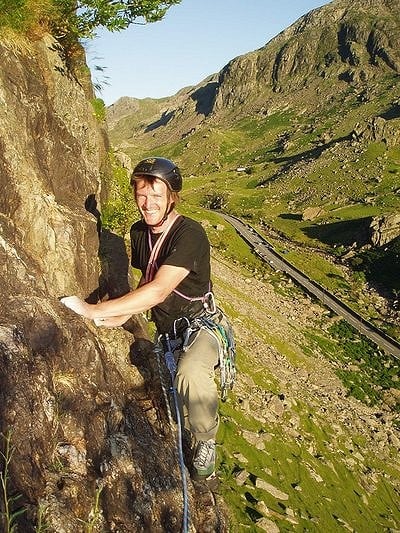
I'd say that if they really want to do it, they should go for it, but be prepared to build up to it over many years. I started off writing scene reports for Climber in my spare time and gradually built up to a point where I could make it into a part time job, and then finally a full time scenario. It took a while to get to that position and it wasn't always easy. When I was making the North Wales Bouldering guide I was working so hard in the evenings (after doing a day's work at my normal job) that I actually made myself ill! I've learnt my lesson the hard way, and I know that I won't ever push it like that again; everybody has a breaking point, and I certainly found mine. Yet despite all the grief (I suffered from Chronic Fatigue Syndrome for 3 years after the guide was published) that book made me what I am. Without that experience I would have struggled to get Ground Up started. I guess sometimes you have to suffer for the long term goal. Experiencing lots of different job scenarios makes for good life and business experience. If you run a small publishing company you have to be able to deal with all sorts of problems and situations. I've done many different jobs over the years, from local council office stuff to working on building sites and being a press officer. I spent 5 years building artificial climbing walls and 6 years in outdoor retail too. It all helps in the end, even the dead end stuff will give you experiences and discipline that will become useful at some point in the future.
Maybe if I was starting out again I would go to college, get a journalism qualification, or try and find work with a mainstream publisher. I'm sure there are pros and cons to that though.
My final advice to the fresh faced teenager would be to state the obvious, i.e. that you won't get rich pursuing this type of job, but if you love climbing it will allow you to lead a great lifestyle. And in the end that has got to be more important, hasn't it?
Any tips and advice on how to get to where you've got to?
Be passionate about what you do; passion will get you through the hard times, and it also breeds loyalty. Be persistent; have a long term goal and follow it. Don't be put off by set backs. Pick yourself up and keep on going. When I first got into writing for magazines there was considerable resistance to reporting or recording new boulder problems. As far as I was concerned bouldering was just another aspect of climbing and it deserved the same level of respect as conventional roped climbing. Exciting things were happening out on the crags, but mainstream climbing media was ignoring it. I stuck to my guns and eventually in 2001 I was given a specific bouldering news column in Climber magazine. And then a couple of years later the Stone Circles bouldering crag spotlight series was launched.
Always be looking to improve what you do; be critical of yourself, become a better writer, a better editor, a better photographer. Don't ever assume that you've reached your high point in anything; there is always room for improvement. People aren't born with a knack for the written word, it needs hard work. Write as much as you can and try and get stuff published, either on the web or in the magazines.
Taking first ascent pics is a good way in. Magazines and websites are always looking for this type of thing, and they won't necessarily expect the images to be technically perfect either. Send in an extended caption with the pics – they might not use it, but at least the editor will know that you can write well.
Any friends through work?
I don't know if I've gained many friends through Ground Up as I knew most of the people who I currently work with before hand. It has re-connected me to a few old friends though. With the magazine work I do get to meet and hang out with a lot of good climbers. It is pretty interesting seeing how different people operate, but it is also quite humbling when you realise how good some of them are! I've done about 50 Stone Circles articles with Ray Wood all around the country. We always try and meet up with local climbers – one day I'll organise a big party and invite them all along.
Any amazing stories?
Hang out at the North Wales crags long enough and you will see some pretty eye popping things. The other night I was on the Ormes; my mate Neil Dyer turned up and decided he wanted to do some routes, but had forgotten his kit. I leant him an old rope and some scraggy old quick draws I had in the boot of my car and off he went. Later that night I walked round the corner and he was leading Tomorrow People (a fierce F7c on the edge of Parisella's Cave) with the rope tied round his waist, wiping the sweat from his hands on his trousers as he didn't have a chalk bag either! He then somehow untied himself and threaded the belay lowering back to the ground with the rope wrapped round one of his legs!
And finally - What's your dream job? Why?
I think I'm doing it.
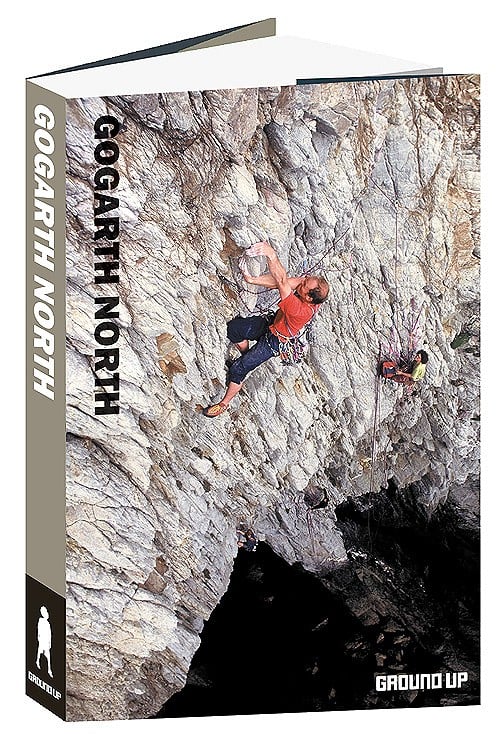

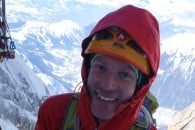

Comments